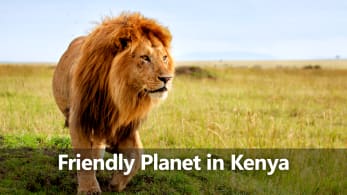 Kenya
Kenya
Once in your lifetime, go to Kenya – the country that perfected the safari! Awake to the sounds of bull elephants drinking from rushing rivers. Witness mass migrations of wildebeests. Ride a hot air balloon over the vast plains, watching breathtaking and diverse wildlife go about their days far below. The landscape is just as memorable (and photogenic!) as the wildlife – from Kenya’s beautiful lakes, beaches, and sweeping panoramic plains. Kenyans say "Karibu" in welcome, with smiles as wide as the horizon.
Highlights
- Kenya Safari
Embark on a Kenya Safari to experience what others call the "classic safari experience." Kenya is home to over 25,000 animal species, including the Big Five, making it one of the world's most biodiverse countries. Among the grassy plains, lush landscape, and views of distant Mount Kenya, you'll find buffalo, elephants, antelope, abundant bird life such as ostriches, cranes, storks, and much more. You might even glimpse the plain's most incredible predators – cheetahs, leopards, and lions!
- Nairobi
Nairobi is Kenya's capital and the most cosmopolitan city in East Africa. The city reverberates to the uniquely Kenyan beat of nightlife music, clanking silverware in some of the continent's best dining options, pleasant conversation in the city's green spaces, and of course, like all major cities, traffic! Nairobi is also home to Nairobi National Park, Kenya's first national park, and a large variety of Kenya's iconic wildlife. The city also hosts several wildlife orphanages and rehabilitation centers for elephants, chimpanzees, and the like. Without spending at least a day in its capital, you can't truly understand Kenya – its culture and people. And then, of course, you can't spend a day in its capital without sliding into a chair at the end of it and cracking open an ice-cold Tusker, the country's most popular beer.
- The Great Wildebeest Migration
Every year, between June and September, millions of wildebeests, zebras, and antelope migrate together – looping between the Serengeti in Tanzania and the Masai Mara in Kenya. Their search for greener pastures and flowing water creates one of the greatest natural spectacles on the planet. In a never-ending cycle, the wildebeest birth 300,000 – 400,000 calves early in the year (Jan – Mar), and by April, they set out from their home in the Serengeti. Then, when September rolls around, the massive herds arrive in Kenya and ready themselves for the journey's peak: crossing the Mara River! This migration is truly one of the world's greatest wildlife spectacles.
- Masai Mara People
Living among the plains in southern Kenya, the Masai Mara people have danced in these homelands for centuries. Prominently located along the African Great Lakes, the Masai speak the Maa language, which is common in several areas around the Nile River. Famous for their music and dance – Masai ceremonies highlight any visit to Kenya's vast rural landscapes. Based on a call-and-response model, the leader, or olaranyani, begins singing the melody and is joined by a chorus that vocalizes the rhythms with harmonies and typical throat singing. This polyphonic-like chant is an authentic, once-in-a-lifetime experience!
Fast Facts
Already booked on one of our packages to Kenya? See everything you need to know before you go.
| Overview | Capital: Nairobi |
| Entry requirements | Please see our Entry Requirements page. |
| Staying Healthy | Malaria Malaria is present in Kenya. Take precautions against getting mosquito bites. Speak with your doctor about taking a prescription medicine (before, during, and after your trip) to prevent malaria. Yellow Fever The CDC recommends Yellow Fever vaccine for all travelers who will visit Yellow Fever Endemic areas of Kenya. Ask your physician for more information. CDC Guidance by country: Kenya World Health Organization, List of Yellow Fever Endemic Countries |
| Weather | Since Kenya is located on the Equator, the weather is temperate with average daytime temperatures in the 60's-80's. However, in higher elevations you may experience cooler temperatures enough for a sweater at night year-round. In the arid, desert like region like Samburu National Park, temperatures may be hotter. |
| Money & Credit Cards | The local currency in Kenya is the Kenyan shilling. Hotels and some stores accept major credit cards. However, for "street shopping" you will need local currency. Your hotel will be able to exchange your cash to local currency. Credit cards are the most convenient way to pay for items you purchase as you travel. Be sure to call your credit card providers to let them know you will be traveling abroad, the places you’ll be visiting and the dates of your trip. This is important for your own protection. We suggest that you bring along cash in small denominations and we highly recommended that you bring crisp, new bills. If you wish to exchange U.S. dollars to the local currency, new, crisp U.S. dollar in large bills ($20, $50, $100) are preferred. Old, torn, crumpled bills & US dollars printed 2012 or earlier are not accepted in East Africa. Travelers’ checks are not accepted in Kenya. Always notify your bank prior to departure to avoid any problems using your credit or debit card while traveling. |
| Shopping | There will be some opportunities to shop for souvenirs, including artwork and handicrafts. Cash may be the only form of payment accepted for shopping in Kenya, particularly throughout the Masai Mara and at the Masai Village. While we take great care in arranging the components of your tour, we have no relationship with the shopping venues you’ll encounter, and we cannot be liable for any purchases you make. Please keep in mind that many, if not most stores outside the U.S. will not allow exchanges or refunds for your purchased items. Please Note: Strict conservation laws in Kenya make it illegal to purchase coral, shells, ivory, or the skins of endangered species. The penalties for trying to transport or smuggle these items out of the country may be severe. Tips for Bargaining: Bargaining is a way of life in Kenya. If you want to purchase something, and you think the price you’ve been quoted is too high, thank the vendor and walk away. Generally, he/she will come after you with a lower price. It is usually considered good bargaining policy to offer half the asking price, and negotiate from there. The negotiations should be done in a respectful way. Kindly note that most hotels and shops maintain fixed prices. |
| Electricity & Power Adapters | 240 volts. Plug G. You will need a voltage converter and plug adapter in order to use U.S. appliances. We recommend getting a universal adapter and converter kit. Learn more about electrical standards around the world. |
| Cell Phones & Internet | Want to take your cell phone, tablet or laptop, but not sure how to get cell service or wifi? Read up on using your cell phone abroad and the top 5 ways to get Internet abroad. |
| Photography | Cameras and video recorders are permitted, and photography is generally permitted everywhere except at airports and military installations. Memory cards for digital cameras will be available in major cities. |
| Did you know? |
|
Frequently Asked Questions
- I heard Kenya has banned plastic bags?
[September 2017] In an effort to curb litter and support environmental sustainability, Kenya has banned most single-use plastic bags. Those arriving in Kenya via airports or land borders will be required to surrender any prohibited bags. (You will not be fined as long as you comply.) The Ziploc® bags used to carry liquids through security are exempt from this ban. The following sorts of bags will not be permitted:
- Duty-free carrier bags
- General shopping bags
- Bin liners (sometimes used to protect luggage during rain)
- Dry cleaning bags (commonly wrapped around clothing)
Some suitable & allowed replacements:
- Paper bags
- Durable, reusable shopping bags
- Bags made from cloth, woven grass or sisal
Videos
Tours & Packages
- Destinations: Kenya
- including closed packages
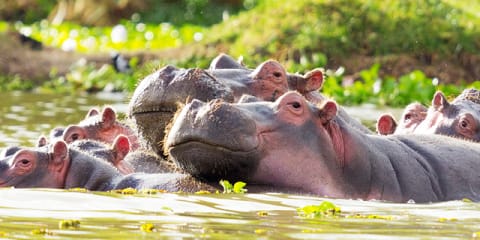
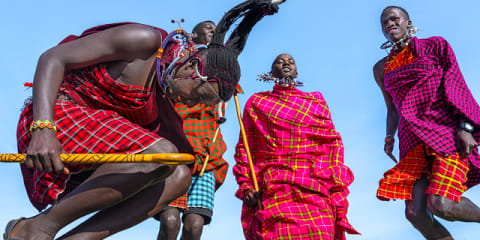
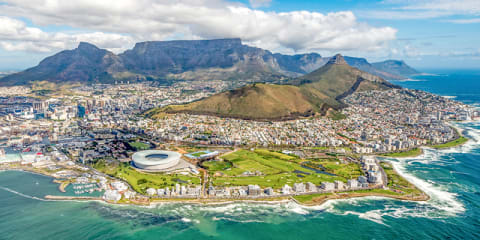
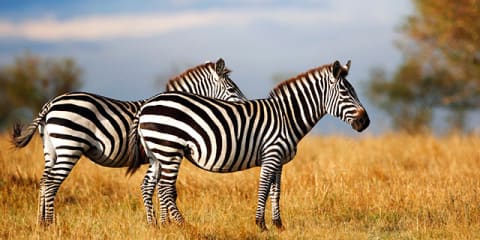
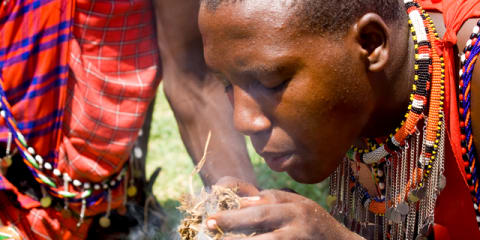
Trip Reviews & Photos
We love hearing your stories and seeing your photos! Check out our entire fan photo gallery and upload your photos.

 Embark on a Kenya Safari to experience what others call the "classic safari experience." Kenya is home to over 25,000 animal species, including the Big Five, making it one of the world's most biodiverse countries. Among the grassy plains, lush landscape, and views of distant Mount Kenya, you'll find buffalo, elephants, antelope, abundant bird life such as ostriches, cranes, storks, and much more. You might even glimpse the plain's most incredible predators – cheetahs, leopards, and lions!
Embark on a Kenya Safari to experience what others call the "classic safari experience." Kenya is home to over 25,000 animal species, including the Big Five, making it one of the world's most biodiverse countries. Among the grassy plains, lush landscape, and views of distant Mount Kenya, you'll find buffalo, elephants, antelope, abundant bird life such as ostriches, cranes, storks, and much more. You might even glimpse the plain's most incredible predators – cheetahs, leopards, and lions! Nairobi is Kenya's capital and the most cosmopolitan city in East Africa. The city reverberates to the uniquely Kenyan beat of nightlife music, clanking silverware in some of the continent's best dining options, pleasant conversation in the city's green spaces, and of course, like all major cities, traffic! Nairobi is also home to Nairobi National Park, Kenya's first national park, and a large variety of Kenya's iconic wildlife. The city also hosts several wildlife orphanages and rehabilitation centers for elephants, chimpanzees, and the like. Without spending at least a day in its capital, you can't truly understand Kenya – its culture and people. And then, of course, you can't spend a day in its capital without sliding into a chair at the end of it and cracking open an ice-cold Tusker, the country's most popular beer.
Nairobi is Kenya's capital and the most cosmopolitan city in East Africa. The city reverberates to the uniquely Kenyan beat of nightlife music, clanking silverware in some of the continent's best dining options, pleasant conversation in the city's green spaces, and of course, like all major cities, traffic! Nairobi is also home to Nairobi National Park, Kenya's first national park, and a large variety of Kenya's iconic wildlife. The city also hosts several wildlife orphanages and rehabilitation centers for elephants, chimpanzees, and the like. Without spending at least a day in its capital, you can't truly understand Kenya – its culture and people. And then, of course, you can't spend a day in its capital without sliding into a chair at the end of it and cracking open an ice-cold Tusker, the country's most popular beer.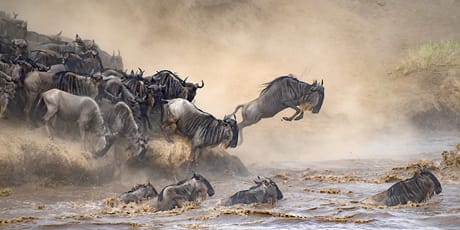 Every year, between June and September, millions of wildebeests, zebras, and antelope migrate together – looping between the Serengeti in Tanzania and the Masai Mara in Kenya. Their search for greener pastures and flowing water creates one of the greatest natural spectacles on the planet. In a never-ending cycle, the wildebeest birth 300,000 – 400,000 calves early in the year (Jan – Mar), and by April, they set out from their home in the Serengeti. Then, when September rolls around, the massive herds arrive in Kenya and ready themselves for the journey's peak: crossing the Mara River! This migration is truly one of the world's greatest wildlife spectacles.
Every year, between June and September, millions of wildebeests, zebras, and antelope migrate together – looping between the Serengeti in Tanzania and the Masai Mara in Kenya. Their search for greener pastures and flowing water creates one of the greatest natural spectacles on the planet. In a never-ending cycle, the wildebeest birth 300,000 – 400,000 calves early in the year (Jan – Mar), and by April, they set out from their home in the Serengeti. Then, when September rolls around, the massive herds arrive in Kenya and ready themselves for the journey's peak: crossing the Mara River! This migration is truly one of the world's greatest wildlife spectacles.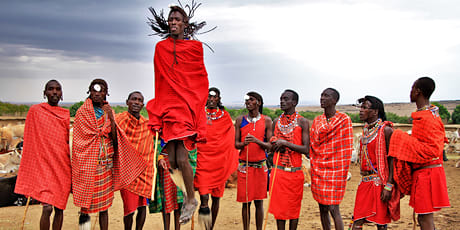 Living among the plains in southern Kenya, the Masai Mara people have danced in these homelands for centuries. Prominently located along the African Great Lakes, the Masai speak the Maa language, which is common in several areas around the Nile River. Famous for their music and dance – Masai ceremonies highlight any visit to Kenya's vast rural landscapes. Based on a call-and-response model, the leader, or olaranyani, begins singing the melody and is joined by a chorus that vocalizes the rhythms with harmonies and typical throat singing. This polyphonic-like chant is an authentic, once-in-a-lifetime experience!
Living among the plains in southern Kenya, the Masai Mara people have danced in these homelands for centuries. Prominently located along the African Great Lakes, the Masai speak the Maa language, which is common in several areas around the Nile River. Famous for their music and dance – Masai ceremonies highlight any visit to Kenya's vast rural landscapes. Based on a call-and-response model, the leader, or olaranyani, begins singing the melody and is joined by a chorus that vocalizes the rhythms with harmonies and typical throat singing. This polyphonic-like chant is an authentic, once-in-a-lifetime experience!